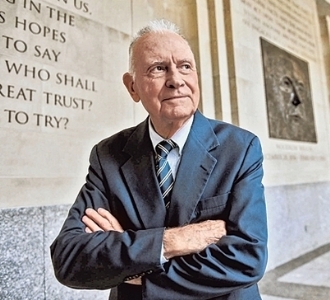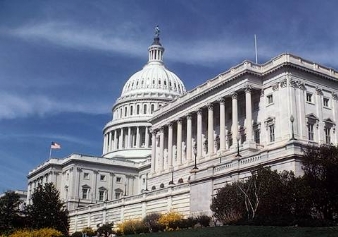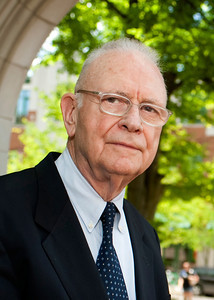Weakening of Political Parties "Carries a Cost to the Country": Lee Hamilton '52
April 15, 2013
 Lee Hamilton, who served 34 years in the U.S. House of Representatives, examines "the diminished influence, if not irrelevance, of both major parties in American politics" in a newspaper op-ed.
Lee Hamilton, who served 34 years in the U.S. House of Representatives, examines "the diminished influence, if not irrelevance, of both major parties in American politics" in a newspaper op-ed.
"In the early years of my political career, the parties were pretty much the only game in town," The 1952 graduate of DePauw University writes. " If you wanted to be a candidate, there was no one else to turn to for help with building a campaign organization, finding volunteers, making contact with activists and donors, or creating a network of supporters. People could and did win elections without official party support -- but not often, and not easily."
Things have changed, the Democrat observes. "At the very top, once the nomination is sewed up, presidential candidates run independently of the party. They have their own staffs, do their own fundraising, and build their own organizations. I’ll be stunned if we don’t see future presidents take a leaf from President Obama’s playbook and form their own grassroots organizations outside the party apparatus to pressure Washington lawmakers."
 According to Hamilton, "The parties’ loss of influence is especially obvious when you look at primaries. Where party approval once was tantamount to nomination, today it’s anything but. In last year’s elections, any number of party-approved candidates were beaten by well-funded outside challengers. It’s one of the reasons that building consensus on Capitol Hill has become so difficult: with congressional districts drawn to favor one party or another, incumbents live in fear of taking a stance that might draw a challenger with special-interest backing. At the state and local level, party organizations are finding it harder than ever to recruit volunteers interested in building the party itself, rather than in promoting a favored cause by trying to take over its apparatus. Where volunteers once put in many hours licking stamps, walking the streets to identify and register voters, or getting people to the polls, today far fewer people feel they can justify the time unless it’s on behalf of a particular candidate or issue."
According to Hamilton, "The parties’ loss of influence is especially obvious when you look at primaries. Where party approval once was tantamount to nomination, today it’s anything but. In last year’s elections, any number of party-approved candidates were beaten by well-funded outside challengers. It’s one of the reasons that building consensus on Capitol Hill has become so difficult: with congressional districts drawn to favor one party or another, incumbents live in fear of taking a stance that might draw a challenger with special-interest backing. At the state and local level, party organizations are finding it harder than ever to recruit volunteers interested in building the party itself, rather than in promoting a favored cause by trying to take over its apparatus. Where volunteers once put in many hours licking stamps, walking the streets to identify and register voters, or getting people to the polls, today far fewer people feel they can justify the time unless it’s on behalf of a particular candidate or issue."
Hamilton concludes, "I favor strengthening the role of political parties in our system. They once played a central role in identifying candidates, articulating ideas and positions, and identifying talent for government; today, those jobs often are not performed at all. Robust political parties might even help break the impasse in Washington. They used to bring a wide array of Americans together under one banner, and pressed their members to learn how to build consensus on behalf of a larger cause. This was a skill that carried over to Capitol Hill. Independence from the party may be a fine thing for self-expression, but it carries a cost to the country."
Robust political parties might even help break the impasse in Washington. They used to bring a wide array of Americans together under one banner, and pressed their members to learn how to build consensus on behalf of a larger cause. This was a skill that carried over to Capitol Hill. Independence from the party may be a fine thing for self-expression, but it carries a cost to the country."
Access the complete column at the website of Texas' Glen Rose Reporter.
Now director of the Center on Congress at Indiana University, Lee H. Hamilton co-chaired the 9/11 Commission and Iraq Study Group and was recently appointed a Professor of Practice at Indiana University's School of Public and Environmental Affairs (SPEA).
Hamilton majored in history as an undergraduate and starred on the Tiger basketball team (and is a member of both the Indiana Basketball Hall of Fame and the DePauw Athletic Hall of Fame). He has been a frequent visitor to DePauw over the years, and delivered an Ubben Lecture on March 15, 2011.
Back